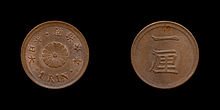1 rin coin
Japan | |
| Value | +1⁄1000 Japanese Yen |
|---|---|
| Mass | 0.91 g |
| Diameter | 15.75 mm |
| Edge | Smooth |
| Shape | Circular |
| Composition | 98% Copper 2% Tin and Zinc |
| Years of minting | 1873–1884; 1892 |
| Obverse | |
| Design | Chrysanthemum crest above "1 Rin", legends separated by dots above. |
| Design date | 1873 |
| Reverse | |
| Design | Value and denomination |
| Design date | 1873 |
The one rin coin (一厘銅貨) was a Japanese coin worth one one-thousandth of a Japanese yen, as 1 rin equalled +1⁄10 sen, and 100 sen equaled 1 yen.[1] While not in circulation any more, one rin coins are bought and sold by numismatists for academic study, and by those with a hobby.
History
One rin coins were first minted in 1873 shortly after Japan adopted a new currency system under the Meiji Restoration.[2] The rin was the lowest denomination coin of this new system which was based around the yen. All one rin coins are made from a bronze alloy, and are five-eights of an inch (15.75mm) in diameter with a weight of fifteen grains (0.9g).[3] The rin was last minted for circulation in 1884, and were discontinued in 1892. According to a statement in "The Japan Daily Mail" given that year, one rin coins had become inconvenient due to their size.[4] One rin coins were also struck in 1892, but these were not placed into circulation causing them to become rare to collectors.
It was noted by 1904 that a rin was worth +1⁄10 of a farthing or +1⁄20 of an American penny.[5] These coins were eventually taken out of circulation at the end of 1953 when a new law that established one form of currency (yen) was enacted.[6]
Circulation figures

Meiji
The following are circulation figures for the one rin coin, all of which were minted between the 6th, and 25th year of Meiji's reign. The dates all begin with the Japanese symbol 明治 (Meiji), followed by the year of his reign the coin was minted. Each coin is read clockwise from right to left, so in the example used below "七十" would read as "year 17" or 1884.
- "Year" ← "Number representing year of reign" ← "Emperors name" (Ex: 年 ← 七十 ← 治明)
| Year of reign | Japanese date | Gregorian date | Mintage |
|---|---|---|---|
| 6th | 六 | 1873 | 6,979,260[7] |
| 7th | 七 | 1874 | 4,881,630[8] |
| 8th | 八 | 1875[a] | 3,718,840[7] |
| 9th | 九 | 1876 | 23,000[7] |
| 10th | 十 | 1877 | Unknown[7] |
| 13th | 三十 | 1880 | 810[7] |
| 15th | 五十 | 1882 | 3,632,360[7] |
| 16th | 六十 | 1883 | 14,128,150[7] |
| 17th | 七十 | 1884 | 16,009,130[7] |
| 25th | 五十二 | 1892 | Not circulated[7] |
Collectability
Common dates for the one rin coin can usually be found online, and at pawn shops where prices vary depending on the condition of the coin.[9] The key date of the series is considered to be 1880 (year 13) as only 810 examples are known to have been struck.
According to NGC reports, it is unknown how many rin coins were struck in 1877 (year 10), the mintages had been low as it was for the previous year. While no coins were struck for circulation in 1892, some are known to have survived. An example in mint state condition sold at an auction held in 2011 for $63,250.00. (USD)[10]
Notes
- ^ Two different varieties exist that have the character "MEI" being separate versus connected. Their mintage is combined in the following column.
References
- ^ John Crowdy. "The British Almanac". Stationers' Company. pp. 112–113. Retrieved December 9, 2016.
- ^ A. Piatt Andrew, Quarterly Journal of Economics, "The End of the Mexican Dollar", 18:3:321–356, 1904, p. 345
- ^ "1厘銅貨" (in Japanese). www.buntetsu.net. Retrieved December 10, 2016.
- ^ A.H. Blackwell (1892). Rin Abolished. Vol. 18. The Japan Daily Mail. p. 271. Retrieved January 9, 2019.
- ^ Walter Del Mar (1904). Around the World Through Japan. A. and C. Black. p. 136. Retrieved June 12, 2017.
Japan one rin coin.
- ^ "小額通貨の整理及び支払金の端数計算に関する法律" [A law of the abolition of currencies in a small denomination and rounding off a fraction, July 15, 1953 Law No.60]. www.shugiin.go.jp. Archived from the original on June 28, 2002. Retrieved December 5, 2016.
- ^ a b c d e f g h i "Japan Rin Y# 15 Yr.10(1877)-Yr.9(1876)". Numismatic Guaranty Corporation. Retrieved December 10, 2016.
- ^ "Japan Weekly Mail". Jappan Meru Shinbunsha. 1875. Retrieved December 10, 2016.
- ^ "1 rin coin". eBay. Retrieved December 11, 2016.
- ^ "M25(1892) JAPAN RIN MS Coin Auctions". Numismatic Guaranty Corporation. Retrieved December 11, 2016.


